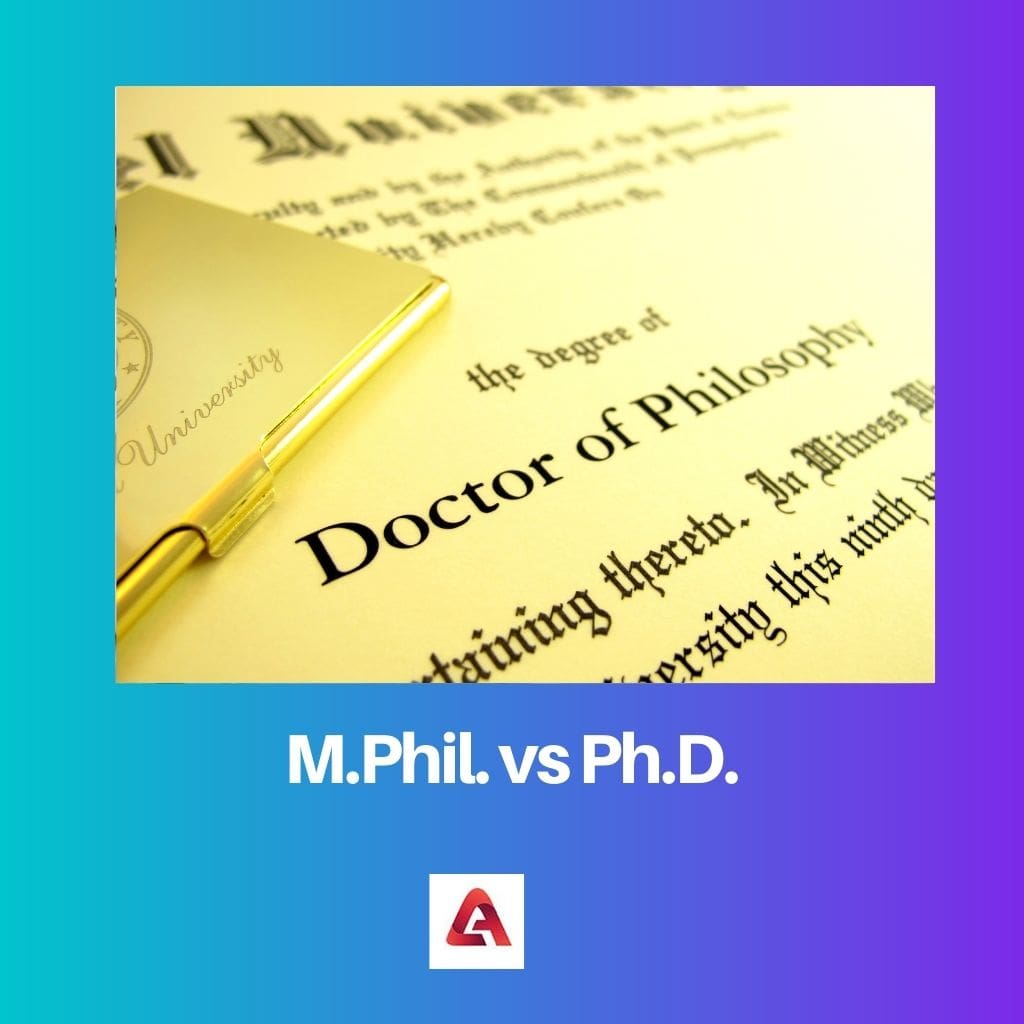An M.Phil. (Master of Philosophy) is a postgraduate research degree that involves coursework and a research project but is shorter in duration and less extensive in scope compared to a Ph.D.
A Ph.D. (Doctor of Philosophy) is the highest academic degree one can earn and involves original research, taking several years to complete, leading to the creation of new knowledge in a specific field.
Key Takeaways
- M.Phil is a postgraduate research degree with a shorter duration and less rigorous requirements than a Ph.D.
- Ph.D. is the highest academic degree, demanding in-depth research and a significant original contribution to a specific field.
- An M.Phil can serve as a stepping stone to a Ph.D., as some institutions require an M.Phil before pursuing a Ph.D.
M.Phil. vs Ph.D.
M.Phil. aka Master of Philosophy and is a 1-2 year program. M.Phil. programs require students to complete a research project or dissertation, but the project’s scope is smaller. Ph.D. aka Doctor of Philosophy and takes 3-5 years to complete. Ph.D. candidates are expected to make an original contribution to their field of study and produce a thesis or dissertation that is publishable in a peer-reviewed journal.

Comparison Table
| Feature | M.Phil. | Ph.D. |
|---|---|---|
| Degree Level | Master of Philosophy | Doctor of Philosophy |
| Focus | Advanced academic study | Original research and contribution to knowledge |
| Length of Study | 2-3 years | 3-5 years (may vary depending on field) |
| Dissertation/Thesis | Required, based on existing knowledge | Required, focused on original research and knowledge contribution |
| Coursework | May be required, depending on program | Usually minimal or not required |
| Research Intensity | Moderate | High |
| Teaching Opportunities | Limited | May include teaching assistantships |
| Career Paths | Academia, research institutions, government agencies, industry | Academia, research institutions, industry leadership, policy development |
| Admission Requirements | Master’s degree, strong academic record, research proposal | Master’s degree, exceptional academic record, strong research proposal, research experience |
| Tuition and Fees | Usually lower than Ph.D. programs | Typically higher than M.Phil. programs |
| Funding Opportunities | Limited scholarships and fellowships | More research funding opportunities available |
| Job Market | Competitive | Highly competitive |
What is M.Phil.?
M.Phil. stands for “Master of Philosophy.” It is a postgraduate academic degree that is positioned between a bachelor’s degree and a Ph.D. (Doctor of Philosophy) in terms of educational levels. M.Phil. programs are offered in various fields of study, including the humanities, social sciences, natural sciences, and more.
Here are some key points about M.Phil.:
- Purpose: The primary purpose of an M.Phil. program is to provide advanced research training and the opportunity for students to explore a specific topic or area of study in depth. It serves as a bridge between undergraduate and doctoral studies.
- Duration: The duration of an M.Phil. program varies by country and institution but takes one to two years of full-time study to complete.
- Coursework: M.Phil. programs include a combination of coursework and research. Students complete coursework in their chosen field of study and engage in independent research under the guidance of a faculty advisor.
- Thesis: A significant component of an M.Phil. program is completing a research thesis or dissertation. The thesis represents the culmination of the student’s independent research efforts and is a substantial academic work.
- Career Path: While M.Phil. graduates can pursue careers in academia or research, the degree is also recognized in other sectors such as industry, government, and non-profit organizations. It can lead to various career opportunities depending on the field of study and individual goals.
- Entry Requirements: Admission to an M.Phil. program requires a bachelor’s degree in a related field and, in some cases, relevant research experience or a strong academic background.
- Geographic Variation: The term “M.Phil.” and the structure of M.Phil. programs may vary in different countries. In some regions, it is a common academic degree, while in others, similar programs may have different names or structures.

What is a Ph.D.?
A Ph.D., or Doctor of Philosophy, is the highest academic degree awarded in many fields of study. It is a terminal degree that signifies a high level of expertise, original research, and significant contributions to a specific field of knowledge. Ph.D. programs are rigorous and demanding, and they are undertaken by individuals who aspire to become experts in their chosen fields or who are passionate about conducting advanced research.
Here are some key characteristics and aspects of a Ph.D.:
- Research Emphasis: Ph.D. programs are primarily research-focused. Candidates are expected to engage in original, independent research that contributes significantly to their field of study. The research conducted during a Ph.D. program is extensive, in-depth, and aimed at advancing knowledge.
- Duration: The duration of a Ph.D. program varies by country, field of study, and individual circumstances. On average, it takes three to five years of full-time study to complete a Ph.D., although some programs may take longer.
- Thesis/Dissertation: A central component of a Ph.D. program is completing a doctoral dissertation or thesis. This comprehensive document presents the results of the candidate’s research, analysis, and findings. The dissertation undergoes a thorough examination and evaluation by experts in the field.
- Originality: Ph.D. research is expected to be original and contribute new knowledge. It involves exploring uncharted territory or addressing previously unanswered questions.
- Academic Rigor: Ph.D. candidates must meet high academic standards and demonstrate a deep understanding of their field. They take advanced coursework related to their research area.
- Specialization: Ph.D. candidates specialize in a specific subfield or area within their chosen discipline. They become experts in that area and significantly contribute to advancing knowledge in that niche.
- Career Opportunities: Ph.D. graduates are well-prepared for academic careers, research institutions, and specialized roles requiring advanced expertise. They hold positions as university professors, researchers, scientists, policy analysts, consultants, and experts in various industries.
- Academic Titles: Upon completing a Ph.D., individuals are awarded the title of “Doctor.” For example, someone with a Ph.D. in biology is addressed as “Dr. Smith” or “Dr. Johnson.”
- Interdisciplinary Study: Ph.D. programs may allow for interdisciplinary study, where candidates draw from multiple fields to address complex research questions.
- Global Recognition: The Ph.D. is a globally recognized academic degree, and holders of this degree are respected for their expertise and contributions to their respective fields.

Main Differences Between M.Phil. and Ph.D.
- Purpose:
- M.Phil.: M.Phil. programs primarily serve as a stepping stone between a bachelor’s degree and a Ph.D. They provide advanced research training and the opportunity to explore a specific topic in-depth. M.Phil. candidates refine their research skills and narrow their research interests.
- Ph.D.: A Ph.D. is the highest academic degree awarded and is designed to enable students to conduct original, groundbreaking research. The primary purpose of a Ph.D. program is to significantly contribute to the field of study through original research and the creation of new knowledge.
- Duration:
- M.Phil.: M.Phil. programs are shorter in duration compared to Ph.D. programs. They take one to two years of full-time study to complete.
- Ph.D.: Ph.D. programs are longer and more comprehensive. They take three to five or more years of full-time study to complete, with a significant portion dedicated to research.
- Research Requirements:
- M.Phil.: While M.Phil. programs include a research component, the research requirements are less extensive and may not be as original or in-depth as Ph.D. research.
- Ph.D.: Ph.D. candidates are expected to conduct original, independent research that contributes significantly to their field. The research undertaken during a Ph.D. is more extensive and rigorous than in an M.Phil. program.
- Thesis/Dissertation:
- M.Phil.: M.Phil. candidates must write a research thesis or dissertation, which is shorter and less comprehensive than a Ph.D. dissertation.
- Ph.D.: A Ph.D. dissertation is a substantial and original piece of research that must demonstrate a high level of expertise and significantly contribute to the field. It is a comprehensive document that undergoes rigorous examination.
- Career Outcomes:
- M.Phil.: M.Phil. graduates can pursue careers in academia or research, but they may also find opportunities in various sectors, including industry, government, and non-profit organizations.
- Ph.D.: Ph.D. graduates are well-prepared for academic careers, research institutions, and specialized roles requiring deep expertise. They are recognized as experts in their area of study.
- Entry Requirements:
- M.Phil.: Admission to an M.Phil. program requires a bachelor’s degree in a related field and, in some cases, relevant research experience or a strong academic background.
- Ph.D.: Admission to a Ph.D. program requires a strong academic record, a master’s degree in a related field (although some programs accept exceptional bachelor’s degree holders), and a well-defined research proposal.
- Geographic Variation:
- The structure and nomenclature of M.Phil. and Ph.D. programs may vary by country and educational system. Some regions may have different names for similar programs.


The article’s detailed comparison table is particularly insightful, providing a clear overview of the differences in degree levels, focus, and other important aspects between M.Phil. and Ph.D. programs. This is immensely helpful for aspiring researchers.
I couldn’t agree more. The table serves as a valuable resource for individuals assessing their academic and research pursuits.
The article presents an insightful and comprehensive comparison of M.Phil. and Ph.D. programs, paving the way for prospective students and researchers to make informed decisions. The detailed descriptions of the purpose, coursework, and career paths are particularly helpful.
I couldn’t agree more. The article’s articulate breakdown of both degrees provides a clear understanding for individuals contemplating their academic journeys.
The information provided in this article is essential for anyone thinking about pursuing higher studies. It offers a clear understanding of the differences between M.Phil. and Ph.D. programs.
Definitely. The article provides valuable guidance for prospective students.
I couldn’t agree more. It’s a comprehensive overview that sheds light on the academic pathways available for students.
The article offers a comprehensive understanding of M.Phil. and Ph.D. programs, guiding readers through the purpose, coursework, duration, and career paths associated with both degrees. It’s a must-read for anyone interested in pursuing higher studies.
Absolutely. The level of detail in this article is exceptional, making it an essential resource for individuals considering advanced academic pursuits.
This article provides valuable insight into the differences between M.Phil and Ph.D. programs. It is clear and informative, laying out the key takeaways and comparison table succinctly.
I completely agree. The article does an excellent job of highlighting the key distinctions between the two degrees and their respective academic demands.
Absolutely. The detailed comparison table is particularly helpful for anyone considering pursuing either degree.
The article presents a well-structured comparison between M.Phil. and Ph.D. programs, offering valuable insights into the respective requirements and focus of each degree.
Absolutely. The article effectively elucidates the distinctions between M.Phil. and Ph.D. programs in a comprehensive yet comprehensible manner.
I share your sentiment. The clarity of information provided here is commendable, making it a useful resource for those seeking clarity on these academic pursuits.